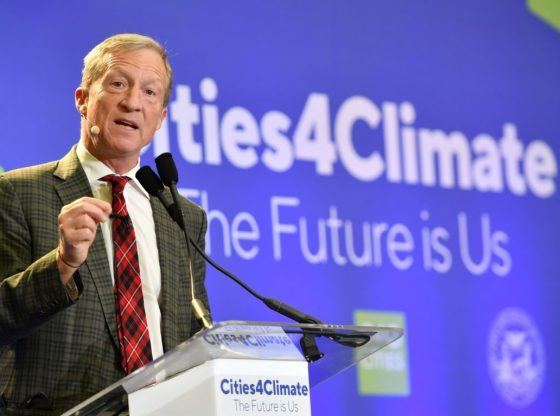Billionaire Tom Steyer Ends Presidential Campaign but Vows to Keep Fighting

A few minutes every morning is all you need.
Stay up to date on the world's Headlines and Human Stories. It's fun, it's factual, it's fluff-free.
On Saturday night, February 29, billionaire Tom Steyer announced that he was ending his campaign for president. The announcement came despite Steyer placing third in Saturday’s South Carolina primary.
The former candidate had distinguished himself as the most outspoken on the issue of climate change, and his years of financially supporting Democrats and progressive issues helped distinguish him in a crowded field.
Steyer dropped out of the race prior to Super Tuesday, even though he had polled well in South Carolina and has personal wealth to spend on campaigning. Regardless of his early exit, Steyer’s lasting impact may be getting the Democratic Party to prioritize climate change.
Tom Steyer ends campaign
In a short speech on Saturday night, Steyer told a crowd of supporters that he was ending his campaign for the president. This came after a disappointing showing in South Carolina where, as NPR reports, he spent US$24 million on television ads alone. He also spent more time campaigning in the state than any other candidate.
While he used his Saturday night speech to announce the end of his campaign, he also made it clear that he had no intention of giving up the fight for a progressive agenda, particularly in South Carolina.
“I’m not leaving,” he said. “We’re already figuring out ways, in fact, to make sure that we stay in South Carolina.”
Steyer has a long history of political activism and has spent a substantial amount of his personal fortune supporting different causes.
Tom Steyer, “hedge fund king” and political activist
In 2008, a Fortune Magazine piece labeled Steyer the “hedge fund king." Following his studies at Yale University and Stanford University, Steyer founded Farallon Capital Management in 1986. Through his hedge fund, he generated a net worth that is now reportedly, US$1.6 billion. That places him at 1,425 on Forbes’ annual list of the richest people in the world.
In 2007, concerned by the reelection of then-President George W. Bush, Steyer and his wife, Kat Taylor, formed OneCalifornia Bank (now Beneficial State Bank). The idea was to use commercial banking as a means of helping people negatively affected by the Bush administration’s policies.
Steyer was a strong supporter of President Barack Obama’s 2008 campaign, even advocating for an increased tax rate on his billions. Discussing the need for the wealthy to contribute more, he told Fortune in 2008, “We have to get back to a sense of shared national purpose and that we are connected and responsible for each other."
After 26 years as a managing partner at Farallon Capital, Steyer sold his stake in the company in 2012 to focus on politics.
Steyer and his wife have donated millions to alternative fuel research, and Steyer founded NextGen Climate in 2013. The original focus of the organization was “supporting candidates, elected officials, and policymakers across the country that will take bold action on climate change.” The organization is now known as NextGen America and works to support progressive candidates.
Steyer reportedly spent US$65 million of his own money during the 2016 election cycle in support of environmental causes and Democratic candidates. His activism and financial support in the 2018 midterms is credited with helping the Democratic party win back the House of Representatives.
Steyer and Taylor, who married in 1986, have four children together. Samuel Taylor, Charles Augustus, Evelyn Hoove and Henry Hume.

Tom Steyer, the climate change candidate
On July 9, 2020, Steyer announced he was running for president after having previously said he would not. He had become one of the Democratic Party’s largest donors in the lead up to the 2020 campaign.
At the time of his announcement, it wasn’t clear how Steyer would distinguish himself among a crowded field of nearly two dozen presidential hopefuls. He outlasted many other candidates, including Washington Governor Jay Insley, who had made fighting climate change the main goal of his campaign. Insley dropped out in August.
With Insley’s absence, Steyer essentially became dubbed the climate change candidate. While Steyer was certainly not the only Democratic candidate to acknowledge the importance of the issue, he had vowed to declare a national emergency as president to take on climate change immediately.

In an interview with NBC News, Steyer stated, “We’ve got to stop talking about this, we have to turn the page to action, and we should do it day one by calling it a state of emergency.”
In addition to prioritizing the climate change fight, Steyer’s planned policies were aimed at “breaking the corporate stranglehold on our government” and “expanding access to the ballot box.” He also discussed increasing affordable housing in the US and combatting the country’s “system of mass incarceration and punishment.”
Tom Steyer’s investments
Though he failed to qualify for the Democratic debate in Las Vegas, Nevada, on February 19, Steyer did appear in the Charleston, South Carolina, debate on Tuesday, February 25. After having been mostly overlooked in the initial primary states, Steyer was polling in third place – behind Joe Biden and Bernie Sanders – on the eve of the February 29 South Carolina primary.
Though it was a victory to make it onto the debate stage, it isn’t clear that Steyer’s appearance there helped him. Notably, Steyer received criticism from Biden for his hedge fund’s 2004 investment in a private prison company, Corrections Corporation of America.
Biden discussed how private prisons have had a reputation for abusing prisoners. Steyer has said the investment was a mistake and that Farallon Capital sold its stakes in the prison company in 2006. It’s unclear how Biden’s line of attack will impact Steyer’s outreach to black voters and his stated policy of prison reform.
There was also concern that Steyer used his wealth for political influence in South Carolina. Steyer’s campaign rented office space from Jennifer Clyburn Reed, daughter of James E. Clyburn, the Democratic House Majority Whip. Payments to Reed’s rental company have totaled US$40,000.
Clyburn, who is black, is believed to have considerable sway over the African American vote in South Carolina, which makes up most of the Democratic primary voter base in the state. It had been suggested that Clyburn might throw his considerable influence behind Steyer, but on February 26, Clyburn endorsed Biden.
[article_ad]




Comments ()